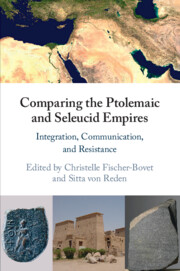Book contents
- Comparing the Ptolemaic and Seleucid Empires
- Comparing the Ptolemaic and Seleucid Empires
- Copyright page
- Contents
- Contributors
- Preface
- Note on Abbreviations
- Maps
- Introduction
- Part I Cities, Settlement and Integration
- Part II Communication and Exchange
- Part III Collaboration, Crisis, and Resistance
- Chapter 8 Legitimizing the Foreign King in the Ptolemaic and Seleucid Empires
- Chapter 9 Antiochus III, Ptolemy IV, and Local Elites
- Chapter 10 Regional Revolts in the Seleucid and Ptolemaic Empires
- Bibliography
- Index
Chapter 8 - Legitimizing the Foreign King in the Ptolemaic and Seleucid Empires
The Role of Local Elites and Priests
from Part III - Collaboration, Crisis, and Resistance
Published online by Cambridge University Press: 17 September 2021
- Comparing the Ptolemaic and Seleucid Empires
- Comparing the Ptolemaic and Seleucid Empires
- Copyright page
- Contents
- Contributors
- Preface
- Note on Abbreviations
- Maps
- Introduction
- Part I Cities, Settlement and Integration
- Part II Communication and Exchange
- Part III Collaboration, Crisis, and Resistance
- Chapter 8 Legitimizing the Foreign King in the Ptolemaic and Seleucid Empires
- Chapter 9 Antiochus III, Ptolemy IV, and Local Elites
- Chapter 10 Regional Revolts in the Seleucid and Ptolemaic Empires
- Bibliography
- Index
Summary
This paper takes as a starting point that the same sort of negotiation occurred between kings and priests in Egypt and in Babylonia, because in both places their temples fulfilled similar economic, social, and religious roles. While the Ptolemies were integrated into the religious rituals from the time of Ptolemy I on, this also implied that they were responsible for maintaining stability. Pfeiffer assesses how the king negotiated situations where his legitimacy was at risk, such as Nile failures or unrest. Focusing on the trilingual decrees, he shows how Ptolemy in Egyptian documents acts perfectly according to Egyptian royal ideology. Only the priests had sufficient knowledge of it to conceive such a narrative. Yet this was not the doing of a homogenous priestly group, but mainly of the Memphite priests. Turning to Seleucid Babylonia, Klinkott examines moments of interaction between kings and priests, such as temple rituals performed by Alexander and the Seleucid temple-rebuilding program. He sheds light on the process of negotiations between the Seleucid kings and the priests, who possibly gathered in a synod, and on the adoption of older Babylonian traditions by the Seleucids.
Keywords
- Type
- Chapter
- Information
- Comparing the Ptolemaic and Seleucid EmpiresIntegration, Communication, and Resistance, pp. 233 - 261Publisher: Cambridge University PressPrint publication year: 2021
- 1
- Cited by

